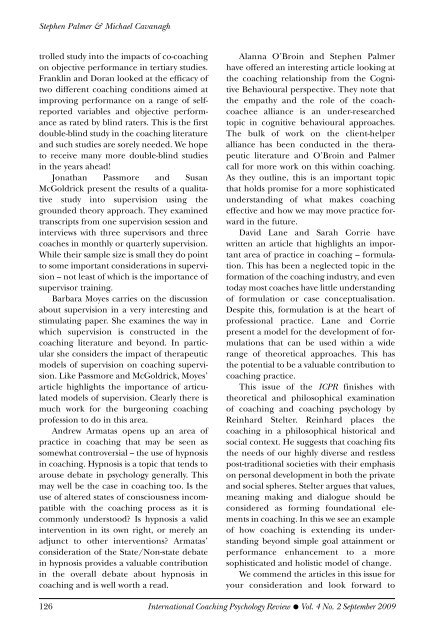International Coaching Psychology Review, 4.2, September 2009
International Coaching Psychology Review, 4.2, September 2009
International Coaching Psychology Review, 4.2, September 2009
Create successful ePaper yourself
Turn your PDF publications into a flip-book with our unique Google optimized e-Paper software.
Stephen Palmer & Michael Cavanagh<br />
trolled study into the impacts of co-coaching<br />
on objective performance in tertiary studies.<br />
Franklin and Doran looked at the efficacy of<br />
two different coaching conditions aimed at<br />
improving performance on a range of selfreported<br />
variables and objective performance<br />
as rated by blind raters. This is the first<br />
double-blind study in the coaching literature<br />
and such studies are sorely needed. We hope<br />
to receive many more double-blind studies<br />
in the years ahead!<br />
Jonathan Passmore and Susan<br />
McGoldrick present the results of a qualitative<br />
study into supervision using the<br />
grounded theory approach. They examined<br />
transcripts from one supervision session and<br />
interviews with three supervisors and three<br />
coaches in monthly or quarterly supervision.<br />
While their sample size is small they do point<br />
to some important considerations in supervision<br />
– not least of which is the importance of<br />
supervisor training.<br />
Barbara Moyes carries on the discussion<br />
about supervision in a very interesting and<br />
stimulating paper. She examines the way in<br />
which supervision is constructed in the<br />
coaching literature and beyond. In particular<br />
she considers the impact of therapeutic<br />
models of supervision on coaching supervision.<br />
Like Passmore and McGoldrick, Moyes’<br />
article highlights the importance of articulated<br />
models of supervision. Clearly there is<br />
much work for the burgeoning coaching<br />
profession to do in this area.<br />
Andrew Armatas opens up an area of<br />
practice in coaching that may be seen as<br />
somewhat controversial – the use of hypnosis<br />
in coaching. Hypnosis is a topic that tends to<br />
arouse debate in psychology generally. This<br />
may well be the case in coaching too. Is the<br />
use of altered states of consciousness incompatible<br />
with the coaching process as it is<br />
commonly understood? Is hypnosis a valid<br />
intervention in its own right, or merely an<br />
adjunct to other interventions? Armatas’<br />
consideration of the State/Non-state debate<br />
in hypnosis provides a valuable contribution<br />
in the overall debate about hypnosis in<br />
coaching and is well worth a read.<br />
Alanna O’Broin and Stephen Palmer<br />
have offered an interesting article looking at<br />
the coaching relationship from the Cognitive<br />
Behavioural perspective. They note that<br />
the empathy and the role of the coachcoachee<br />
alliance is an under-researched<br />
topic in cognitive behavioural approaches.<br />
The bulk of work on the client-helper<br />
alliance has been conducted in the therapeutic<br />
literature and O’Broin and Palmer<br />
call for more work on this within coaching.<br />
As they outline, this is an important topic<br />
that holds promise for a more sophisticated<br />
understanding of what makes coaching<br />
effective and how we may move practice forward<br />
in the future.<br />
David Lane and Sarah Corrie have<br />
written an article that highlights an important<br />
area of practice in coaching – formulation.<br />
This has been a neglected topic in the<br />
formation of the coaching industry, and even<br />
today most coaches have little understanding<br />
of formulation or case conceptualisation.<br />
Despite this, formulation is at the heart of<br />
professional practice. Lane and Corrie<br />
present a model for the development of formulations<br />
that can be used within a wide<br />
range of theoretical approaches. This has<br />
the potential to be a valuable contribution to<br />
coaching practice.<br />
This issue of the ICPR finishes with<br />
theoretical and philosophical examination<br />
of coaching and coaching psychology by<br />
Reinhard Stelter. Reinhard places the<br />
coaching in a philosophical historical and<br />
social context. He suggests that coaching fits<br />
the needs of our highly diverse and restless<br />
post-traditional societies with their emphasis<br />
on personal development in both the private<br />
and social spheres. Stelter argues that values,<br />
meaning making and dialogue should be<br />
considered as forming foundational elements<br />
in coaching. In this we see an example<br />
of how coaching is extending its understanding<br />
beyond simple goal attainment or<br />
performance enhancement to a more<br />
sophisticated and holistic model of change.<br />
We commend the articles in this issue for<br />
your consideration and look forward to<br />
126 <strong>International</strong> <strong>Coaching</strong> <strong>Psychology</strong> <strong>Review</strong> ● Vol. 4 No. 2 <strong>September</strong> <strong>2009</strong>

















